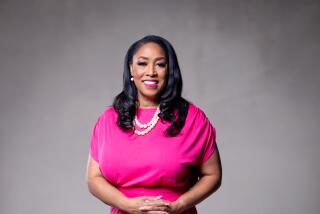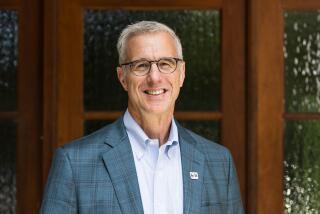RELIGION : Taking Command : Salvation Army Gen. Rader Is Regarded as an Innovator
- Share via
Salvation Army Gen. Paul A. Rader, the newly chosen top brass for an organization known best for its relief work, Christmas kettles and uniformed street corner musicians, is expected to bring some unorthodox ideas developed in Southern California to the staid global church body.
The Salvation Army center in Northridge has been one test tube for these innovations.
Rader, who has been commander of the 13-state western territory based in Rancho Palos Verdes since 1989, was called “innovative” and “a visionary” by Salvation Army workers in the San Fernando Valley area.
The lean, 60-year-old Rader became the first American-born officer to win the top Salvation Army post in a special election last Saturday in London, where the army was born and is still headquartered. He returned to Los Angeles from London on Friday evening to prepare for his permanent move back to take command.
“We want to be on the cutting edge of evangelism and the social service,” Rader said in an interview after being greeted by a Salvation Army band at Los Angeles International Airport.
“I think there is always a tendency for a 129-year-old organization to settle down in comfort, but our track record here has been to encourage innovation . . .”
As head of the western territory, Rader launched five experimental New Life Centers aimed at attracting “unchurched” baby boomers to informal, music-and-discussion sessions without the usual quasi-military trappings.
Beginning Sept. 3, the Northridge New Life Center, nine months in the making, will launch “Nite Life,” a weekly Saturday night gathering for music, discussion and gourmet coffee--but no hymns, no prayers, no uniforms, according to Cecil and Joy Sellers, the envoys, or noncommissioned officers, in charge.
“This is Gen. Rader’s brainchild,” said Cecil Sellers, whose Northridge home has so far served as headquarters. “Ours is the fifth New Life Center started in the western territory and only the second in California--quite a bold venture for the Salvation Army.
“We don’t see a need for a worship service until we have believing Christians who want to come to services,” said Cecil. At last count, the Salvation Army had 450,000 members in more than 1,150 congregations in this country.
Even at the rather conventional Salvation Army congregation and community center in Van Nuys, a Saturday night coffee house featuring a different Christian entertainer each week was added in April to the usual Sunday worship schedule.
Lt. Troy Trimmer, newly assigned to Van Nuys with his lieutenant-wife Analene, said that attendance has been small but should improve with better publicity.
Trimmer said that the army’s new general will stay with tradition where it continues to work well, but “if certain methods don’t reach people, we won’t stick with them just because tradition is involved.”
This strategy comes largely from concepts Rader was exposed to after interrupting his missionary work in South Korea for two years to study for a doctorate in missiology at the School of World Mission in Pasadena’s Fuller Theological Seminary.
“He came to us quite discouraged because he saw the Presbyterian churches growing and the Salvation Army was not,” said Arthur F. Glasser, a former dean at Fuller who was Rader’s mentor from 1971 to 1973. At the end of that time, “he produced a dissertation that was very practical and beautifully written,” Glasser said.
Paul Pierson, who followed Glasser as dean of the school of world mission, said that Rader “really re-energized the Salvation Army in Korea when he returned.”
After Rader and his wife, Kay, ended 22 years of service in South Korea in 1984, they took posts in the eastern United States. He rose to the rank of territorial commander, briefly heading the eastern territory, then came to California to assume command of the western territory.
“The school of world mission, which has had more than 3,000 graduates since 1965, named Rader alumnus of the year in 1992 in recognition of his achievements,” said Pierson, who is currently interim pastor of Bel Air Presbyterian Church in Encino and teaches part-time at Fuller.
The Salvation Army, best known for its social service and emergency relief work, has been ever present during a series of California earthquakes and fires. Even here, Rader was not always the conventional leader.
Besides the 250,000 gallons of water, 140 tons of clothing and other assistance provided by the Southern California division following the Jan. 17 Northridge earthquake, Rader canceled officer training classes at headquarters for two weeks so that 90 cadets and 30 faculty members could join in relief tasks.
“He’s a hands-on leader, remembers people and is a very fine speaker,” said Capt. Stephen Hartt, who administers the army’s 84-bed Adult Rehabilitation Center in Van Nuys, part of the army’s nationwide network of alcohol and drug recovery centers.
In remarks to the press this week in London, Rader said the Salvation Army remains a theologically conservative, evangelical denomination with a pronounced social conscience.
“All across the world our mission is the same: to preach the Gospel of Jesus Christ and to live it out in compassionate service to the neediest among us,” he said. “We specialize in the hard cases.”
Salvation Army founder William Booth, a former Methodist, began the organization in London in 1865. The American branch was created in 1880. A daughter, Evangeline Booth, headed the U.S. movement from 1904 to 1934. When she was chosen to lead the international organization from 1934 to 1939, she had already become an American citizen.
But American-born Salvationists, as they often call themselves, were shut out of the top post in later years.
“It appears there had been a reluctance to pick a general of the international army from the largest and wealthiest of the army branches,” said Diane Winston, who is completing a doctoral dissertation at Princeton University on the Salvation Army and U.S. popular culture.
On Friday, Raider waved away any suggestion of an anti-American bias in the army. “In recent years, we’ve had Canadians and Australians, a Swede and a Finn, as general,” he said. “I like to think it’s always been the right person for the moment.”
More to Read
Sign up for Essential California
The most important California stories and recommendations in your inbox every morning.
You may occasionally receive promotional content from the Los Angeles Times.










